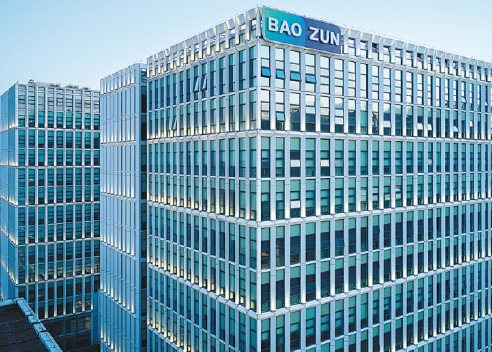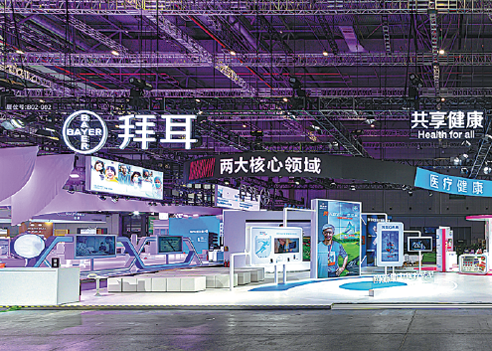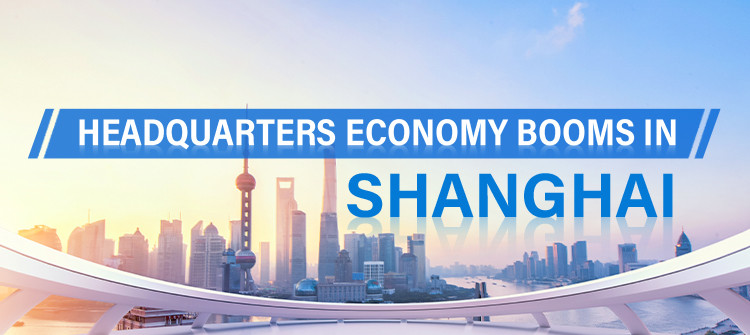Shanghai's role as premier business hub thriving despite pandemic

The office building of e-commerce business service provider Baozun in Jing'an district, Shanghai. CHINA DAILY
City makes strides in cruise industry, financial services, biomedicine and agriculture as 5th CIIE approaches
Shanghai, at the frontier of China's economic reform and opening-up, has become one of the most popular destinations for global investors over the last 10 years. That momentum remains unchanged despite the COVID-19 pandemic.
Viking Cruises, an award-winning international cruise company that started business in the Chinese market in 2016, officially moved into its new office at Sinar Mas Plaza, one of the tallest office buildings in Hongkou district of Shanghai in September, marking a new milestone in its development.
Brendan Tansey, managing director of Viking Cruises China, said that as the key representative office in the China market, Viking Shanghai is responsible for developing cruise travel products, introducing industry-leading international cruise operations and providing management insight.
"The Chinese market has always been very important for Viking. Shanghai, as China's economic and trade center, will surely be one of our essential markets," Tansey said.
He said the company will continue to seize extensive opportunities in Shanghai by creating more new itineraries and building the Coastal Cruising category from Shanghai and other coastal cities in China to meet the increasing needs of the country's discerning travelers.
In November, China Merchants Viking Cruises, a joint venture founded by Viking Cruises and China Merchants Shekou, will operate a series of home port cruises that depart from Shanghai, including the highly anticipated eight-day itinerary that is planned to set sail on Nov 13.
This itinerary will take guests to explore the southeast coastal destinations of Zhoushan and Xiamen, along with rich and in-depth cultural experiences both onshore and onboard, said Tansey.
"Our November cruises have seen strong demand. To date, most cabin categories have sold out. Nevertheless, we are still receiving many inquiries from guests," he said.
The company has just launched its 2023 cruise itineraries with Shanghai as the starting port. Its eight-day product known as the Eight-Day Southeast Coast Cultural Journey will cruise from Shenzhen to Shanghai or Shanghai to Shenzhen, both with stopovers in Xiamen and Zhoushan. It plans to sail between March 19, 2023 and Nov 19, 2023.
Sailing on the first Chinese-flagged luxury ship, China Merchants Yidun, the itinerary will take guests to coastal destinations and let them enjoy culturally enriching shore excursions.
With unique cuisines and beverages, entertainment and enrichment experiences provided onboard, guests will be able to enjoy a different cultural cruise experience compared to other large or mega ships that operate in the Chinese market.
Tansey said that despite the impact of the pandemic on the travel industry, the company still sees the travel demand of Chinese consumers increasing and diversifying.
"In the past year, although COVID-19 has brought a lot of challenges to the whole industry, we have successfully operated our domestic coastal cruises throughout this time. With our comprehensive COVID-19 prevention and protection protocols, we've proved we are a safe travel option in the domestic market," Tansey said.
He added that as the pandemic is still ongoing, dealing with "starts and stops" will become the "new normal" in the travel industry.
"This has driven us to ensure our operations and processes are nimble, enabling us to deal with last-minute COVID-related changes. This will allow us to maintain market trust and goodwill for the long-term development of our business in China," he added.

Bayer, an innovative enterprise focusing on life sciences showcases its
products at the 2021 China International Import Expo. CHINA DAILY
Expanding operations
Viking Cruises is not the only investor that maintains strong confidence and is keen to launch new projects in Shanghai.
Gong Zheng, the mayor of Shanghai, awarded certificates on June 15 to 30 headquarters and 10 research and development centers operated by multinational enterprises in the city.
Baozun, a Nasdaq and Hong Kong-listed e-commerce business service provider, which focuses on online store operations, digital marketing, information technology support, warehouse storage and delivery and customer services, received a certificate for its research and development center in Jing'an district of Shanghai.
The R&D center, which covers 6,000 square meters and boasts more than 1,000 engineers, has been put into use. The center will use cutting-edge technologies including cloud computing, big data and artificial intelligence to develop a supportive system for brands to achieve fruitful results in their operations. Baozun plans to invest more than 500 million yuan ($69.25 million) into R&D every year.
"Despite Shanghai being hit by the outbreak of COVID-19, its position in the global market and rapid growth trend will not change," said Zhu Wenhua, vice-president of Baozun.
Zhu said Shanghai takes the core position of supporting China's economic development. It has attracted many leading enterprises to set up their regional headquarters. The city also boasts a large number of high-caliber talents which ensures companies can find the right personnel in the fastest manner possible.
"Shanghai has a first-class business environment in China and even across the globe, which guarantees enterprises can achieve excellent results. The city also keeps implementing new policies to help companies tackle challenges," said Zhu. "We will continue to expand in Shanghai to become an omnipotent company."
Baozun, set up in Shanghai in 2007, is expanding its partnerships. It established a strategic alliance with Fosun Fashion Group, a subsidiary of Fosun International Limited, to capitalize on the emerging demand for luxury brands in China last year.
Under the deal, Baozun and FFG will work to support FFG's e-commerce development in China, while exploring opportunities to introduce new brands to the Chinese market. Baozun will become the preferred one-stop e-commerce solutions provider for all brands in FFG's portfolio, as well as FFG's preferred partner in exploring new business models and solutions for e-commerce brands.
Over the last 10 years, Shanghai has seen a steady influx of foreign investors. Gu Jun, director of the Shanghai Commission of Commerce, said Shanghai's actual use of foreign direct investment exceeded $300 billion by the end of 2021, up from $168 billion in 2012.
By the end of September, the city was home to the regional headquarters of 877 multinational corporations, as well as 523 foreign-funded R&D centers.
Abiding by high-quality development, Shanghai has seen its proportion in the global market continue to rise, and has become the world's largest trading city.
In 2021, imports and exports through the city's ports reached 10.1 trillion yuan ($1.42 trillion), accounting for about 3.6 percent of global trade. Specifically, imports and exports of goods surpassed 4 trillion yuan for the first time, and imports and exports of services rose to $229.41 billion, the largest among Chinese provinces, municipalities and autonomous regions.

The first Chinese-flagged luxury ship, China Merchants Yidun, is taking
passengers to the coastal destination of Zhoushan, Zhejiang province.
CHINA DAILY
Maintaining commitment
Looking ahead, companies in Shanghai, which is known for premium performance, will maintain their commitment in Shanghai despite the setbacks caused by the pandemic.
"Shanghai is the home of Bayer China. This promising land showcases the charm of China to Bayer," said Gao Yong, vice-president of public affairs and sustainability of Bayer China.
As an innovative enterprise focusing on life sciences, Bayer began its journey in China in 1882, and set up its first legal entity in Shanghai in 1913.
"For more than 100 years, Bayer and Shanghai have been empowering each other and growing together. Bayer has witnessed the dramatic changes in Shanghai in reforms and opening-up. Shanghai has also contributed to Bayer's growth in China," said Gao.
So far, Shanghai is home to the Chinese headquarters of Bayer. Gao said Bayer placed its Chinese headquarters in Shanghai for two reasons. One is market-driven, and the other is strong policy support from the Shanghai government.
The city also boasts the Asia-Pacific headquarters and Chinese headquarters of the Bayer consumer health division.
"We see the resolve of the Shanghai government in promoting opening-up and its efforts to build a market-oriented, law-based and international business environment through concrete actions," said Gao. "Today, Shanghai has become one of the most preferred business destinations for foreign investors. It is also a hub for global leading foreign investors."
Gao noted that the annual China International Import Expo, held in Shanghai every November since 2018, is playing a vital role in supporting the development of Bayer in China. The event helps Bayer introduce more innovative products to China, and also serves as a platform to connect Bayer with excellent companies around the world.
Gao said Bayer will take part in the fifth CIIE scheduled to run from Nov 5 to 10 to showcase its new products and services and contribute to China's development.
Besides its main pavilion in the Pharmaceutical Area, Bayer will also set up a second booth within the crop and seeds subsection of the Food and Agriculture Area, a newly established area for the 2022 CIIE, to support China's endeavors in bolstering seed industry development in the country.






